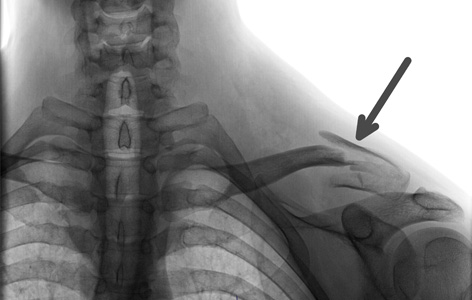Home page Description:
Survivors of mild to moderate stroke have an increased risk of developing bone fractures.
Posted On: January 25, 2017

Image Caption:
A bone fracture (depicted in this X-ray image) can lead to hospitalization, admission to a long-term care facility, reduced mobility and chronic pain.
Stroke is a leading cause of disability in adults. In addition to brain injury, it is associated with a decline in bone quality and an increased risk of falling. Both of these can increase the risk of developing bone fractures; however, it is not known how much of this risk is directly attributable to the stroke and how much is due to other factors that are associated with stroke, such as older age, which is itself linked to bone loss.
To address this gap in knowledge, TGHRI Senior Scientist Dr. Moira Kapral and her colleagues examined the frequency of bone fractures among those with stroke and those with transient ischemic attack (TIA), also known as mini-stroke. People with TIA experience short-term stroke-like symptoms, but do not suffer from severe or permanent brain damage. Given that they tend to be of a similar age and health status as those with stroke, people with TIA represent an ideal comparison group for researchers to determine if stroke-related brain damage increases the risk of fractures.
The research team reviewed the medical records of over 30,000 people who had experienced a stroke or a TIA. They found that the risk of bone fracture in those with a stroke was 32% higher than that in those with TIA and 47% higher than that in people without stroke or TIA. Among those with stroke, the risk factors that were associated with fractures included older age, female sex and stroke severity.
“Our study only examined fractures that were reported to doctors, so the actual rate of fractures may be higher as some broken bones do not necessarily lead to obvious symptoms,” says Dr. Kapral. “Our results indicate that future research should focus on identifying those who would benefit from screening and intervention to prevent stroke-related fractures.”
This work was supported by the Heart and Stroke Foundation of Canada (Ontario Provincial Office), the National Institute of Arthritis and Musculoskeletal and Skin Diseases, and the Toronto General & Western Hospital Foundation. M Kapral held a Career Investigator Award from the Heart and Stroke Foundation of Canada. A Cheung is a Tier 1 Canada Research Chair in Musculoskeletal and Postmenopausal Health.
Kapral MK, Fang J, Alibhai SM, Cram P, Cheung AM, Casaubon LK, Prager M, Stamplecoski M, Rashkovan B, Austin PC. Risk of fractures after stroke: Results from the Ontario Stroke Registry. Neurology. 2016 Nov 23. doi 10.1212/WNL.0000000000003457.
To address this gap in knowledge, TGHRI Senior Scientist Dr. Moira Kapral and her colleagues examined the frequency of bone fractures among those with stroke and those with transient ischemic attack (TIA), also known as mini-stroke. People with TIA experience short-term stroke-like symptoms, but do not suffer from severe or permanent brain damage. Given that they tend to be of a similar age and health status as those with stroke, people with TIA represent an ideal comparison group for researchers to determine if stroke-related brain damage increases the risk of fractures.
The research team reviewed the medical records of over 30,000 people who had experienced a stroke or a TIA. They found that the risk of bone fracture in those with a stroke was 32% higher than that in those with TIA and 47% higher than that in people without stroke or TIA. Among those with stroke, the risk factors that were associated with fractures included older age, female sex and stroke severity.
“Our study only examined fractures that were reported to doctors, so the actual rate of fractures may be higher as some broken bones do not necessarily lead to obvious symptoms,” says Dr. Kapral. “Our results indicate that future research should focus on identifying those who would benefit from screening and intervention to prevent stroke-related fractures.”
This work was supported by the Heart and Stroke Foundation of Canada (Ontario Provincial Office), the National Institute of Arthritis and Musculoskeletal and Skin Diseases, and the Toronto General & Western Hospital Foundation. M Kapral held a Career Investigator Award from the Heart and Stroke Foundation of Canada. A Cheung is a Tier 1 Canada Research Chair in Musculoskeletal and Postmenopausal Health.
Kapral MK, Fang J, Alibhai SM, Cram P, Cheung AM, Casaubon LK, Prager M, Stamplecoski M, Rashkovan B, Austin PC. Risk of fractures after stroke: Results from the Ontario Stroke Registry. Neurology. 2016 Nov 23. doi 10.1212/WNL.0000000000003457.

